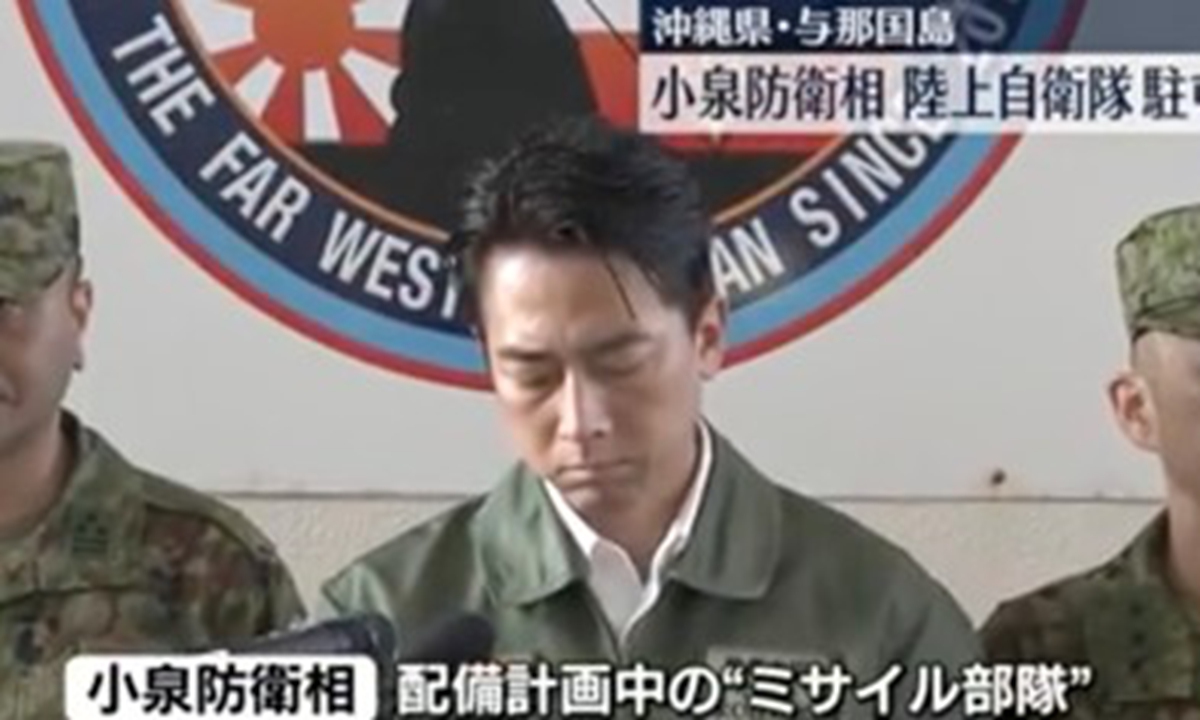
A screenshot from Japanese media Nippon News Network on Japanese defense minister Shinjiro Koizumi speaking to reporters as he wraps up his trip to Yonaguni island
After Japan's defense minister reportedly talked about the deployment of missiles on an island near China's Taiwan island, Chinese analysts slammed that this step would further inflame an already volatile situation, noting that this shows as China-Japan relations remain strained by Japanese Prime Minister Sanae Takaichi's erroneous remarks on Taiwan, Tokyo is still pushing ahead with planned missile deployment on the island closest to Taiwan island - a sign the current Japanese government is continuing a confrontational stance that could exacerbate regional situation.
Japanese defense minister Shinjiro Koizumi claimed plans to deploy missiles on Yonaguni island would "lower the chance of an armed attack," rejecting concerns that it would heighten regional tensions. He made the remarks on Sunday when speaking to reporters as he wrapped up his trip to the base on Yonaguni. Yonaguni hosts the Japan Self-Defense Forces' base closest to Taiwan island, according to Nippon News Network.
A Kyodo News report noted that when asked about Yonaguni's strategic role in the "event of a contingency," he claimed he would "refrain from answering questions based on hypothetical scenarios."
Yonaguni island lies about 110 kilometers from Taiwan island. Japan plans to deploy a unit equipped with the Type-03 medium-range surface-to-air missile, which is capable of intercepting aircraft and ballistic missiles, according to Kyodo News.
Koizumi's visit to Yonaguni at such a moment is highly sensitive. With China-Japan relations already strained by Prime Minister Takaichi's provocative remarks on Taiwan, Tokyo is pressing ahead with missile deployment on the island closest to Taiwan island. This underscores that the current Japanese government is doubling down on a confrontational stance and is not treating the damage to bilateral ties with sufficient seriousness. Such an approach is extremely dangerous, Lü Chao, an expert from the Liaoning Academy of Social Sciences, told the Global Times on Monday.
Lü said that Japan is steadily drifting away from its long-held principle of "exclusive self-defense." Koizumi's remarks serve only to justify Japan's accelerating military buildup. It is clear that Japan is moving further down a dangerous path. In recent years, Japanese military deployments have increasingly aligned with Washington's so-called Indo-Pacific strategy, said the expert.
Lü said that deploying offensive missiles so close to Taiwan island reveals clear political and military intent of Japan. It exposes Japan's strategic ambitions, heightens tensions in the Taiwan Straits and the region, he said.
According to media reports, the Japanese government's plan to further militarize Yonaguni has placed local residents at the center of geopolitical tensions, stirring unease about the island's future.
Some Japanese netizens also commented under news reports of Koizumi's remarks, arguing that forcibly deploying missile units will only heighten regional tensions and increase the risk of Yonaguni residents being dragged into conflict. One commenter wrote, "If you play with fire, getting burned is only natural."
Shii Kazuo, chairman of the Japanese Communist Party and member of the House of Representatives, posted on X on Sunday, saying "The government keeps repeating that the ongoing massive military expansion is 'to protect Japan,' but the truth of the matter is that it is 'to protect the US military.' And the US military openly promotes 'preemptive strikes' as a basic principle of 'integrated air defense missile defense.'"
"How can the participation of the Self-Defense Forces in the US military's 'preemptive strikes' possibly constitute defense of Japan? Isn't it just putting the citizens in danger?" Kazuo wrote.
Song Zhongping, a military affairs expert, told the Global Times that Yonaguni island, part of the Ryukyu island chain and close to Taiwan, is not part of Japan's main islands. Japan's deployment of missiles and intelligence systems there is aimed at interfering in China's internal affairs, especially the Taiwan question.
If Japan chooses to interfere in China's internal affairs through its actions, China will respond accordingly - including taking actions against Japan's main islands. Tokyo must recognize that its home islands are not insulated from the consequences of such behavior, said Song.
"Koizumi's remarks reveal that he has not understood how vital the Taiwan question is to China, nor is he aware of the serious consequences such misjudgments could trigger," Song said, noting that Koizumi's latest remarks not only fail to ease tensions after Takaichi's comments but further inflame an already volatile situation.
If Japan continues to create new frictions and push bilateral ties deeper into crisis, recovery of bilateral ties will become harder and the risk of confrontation will grow, said Song.



